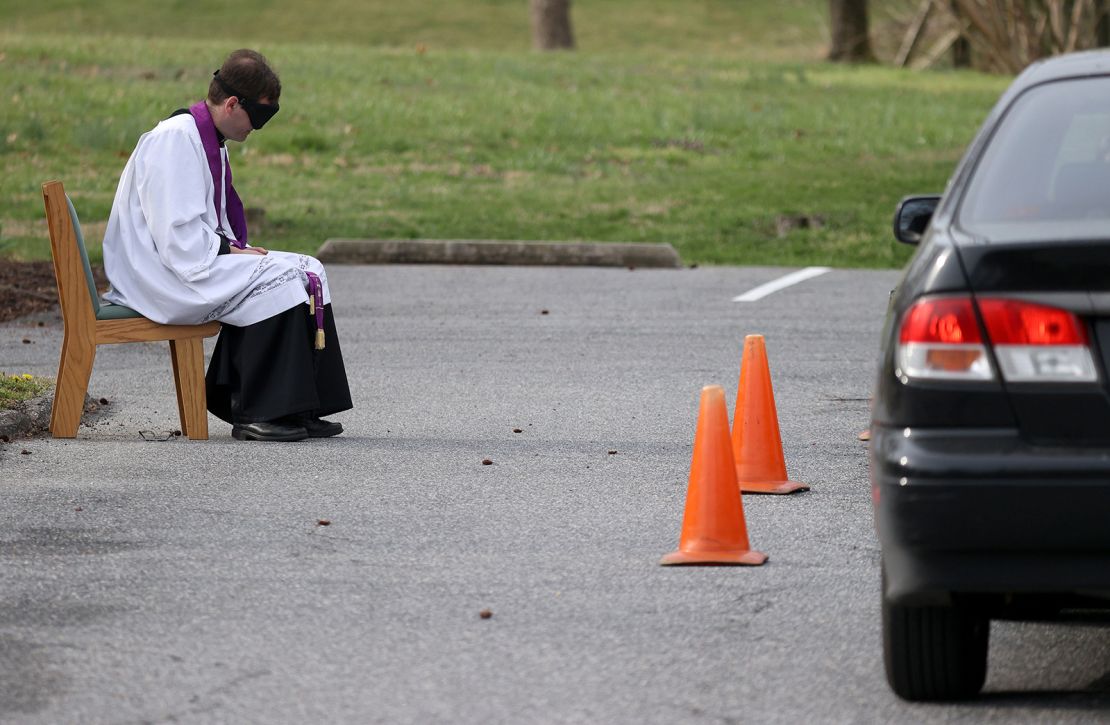Editor’s Note: Guthrie Graves-Fitzsimmons is a fellow with the Faith and Progressive Policy Initiative at the Center for American Progress. Follow him on Twitter @GuthrieGF. The views expressed here are the author’s. View more opinion on CNN.
One recent Friday, the same day President Donald Trump confirmed that Vice President Mike Pence’s press secretary tested positive for the novel coronavirus, Pence traveled to Iowa and signaled to religious leaders that they should reopen houses of worship. He falsely claimed that “for most healthy Americans, the risks that the coronavirus poses remains very low” and thanked religious leaders for “[stepping] forward back into the exercise of your faith.” In addition, CNN reported the day prior that the Trump administration will not implement any of the guidance from the US Centers for Disease Control and Prevention (CDC) on reopening, in part, because of a “religious freedom” concern about placing any restrictions on churches. The administration is once again trying to unfurl the banner of what it might describe as religious freedom, this time as cover for a premature push to reopen the economy.

“The liberties enshrined in the Constitution still apply to every American, even in the middle of a national emergency,” Pence said on a conservative radio program last week, in reference to a religious freedom lawsuit in Virginia challenging the state’s stay-at-home order. “President Trump and our entire administration have championed religious liberty.”
From a wider perspective, the Covid-19 crisis also reveals a new dimension to how some conservatives have distorted our treasured American value of religious freedom.
The virus does not discriminate whether we are gathered in a house of worship or any other type of gathering. State and local governments are within their constitutional authority to include houses of worship in bans on gathering. Yet at least 20 states instituted some form of a religious exemption to their Covid-19 public-health orders. And in addition to the Virginia lawsuit, there have been at least a dozen more lawsuits in states such as Florida, Mississippi, Kansas, Virginia, California and Texas. Now the push for reopening by the administration has been coupled with a religious freedom argument. This comes as many religious communities are continuing to care for one another and the common good by adapting to the trying circumstances.

Religious freedom is not a license to spread the coronavirus, and this is not the first time it has been exploited to pursue a conservative agenda. For years, conservatives have tried to use religious freedom as a license to deny women reproductive health care or discriminate against LGBTQ people. According to a watchdog report, the legal advocacy groups arguing the cases challenging stay-at-home orders on religious grounds are the same ones that have waged a so-called religious freedom war against the LGBTQ community.
This effort to redefine religious freedom is extremely well-funded. For instance, take just three of the groups that according to the same watchdog report are involved in the Covid-19 religious freedom litigation. In their 2018 IRS tax filings, Alliance Defending Freedom (which argued the Masterpiece Cakeshop anti-LGBTQ case at the Supreme Court) reported spending over $54 million; First Liberty Institute reported over $9 million; and the Becket Fund for Religious Liberty (which argued the Hobby Lobby anti-contraception case) reported over $6 million.
Just last week, the US Supreme Court heard arguments concerning whether religious or moral beliefs of an employer should be an acceptable excuse to deny people birth control. During its next term, the Court will consider a case to determine whether taxpayer funds may be used for faith-based foster care agencies that discriminate against LGBTQ people.
The efforts of these purported religious freedom warriors don’t reflect the views of most religious Americans. According to the Public Religion Research Institute, majorities of all American religious groups oppose religious exemptions from coronavirus public health orders, support requiring employer-provided health care coverage to include contraception at no cost, and oppose allowing adoption agencies that receive federal support from excluding gay and lesbian couples from being considered as parents.
The reason their agenda is out of alignment with what so many religious Americans say they want exposes the truth: This is not about religious freedom. It’s about taking control in a culture war and stoking anti-science and anti-government feeling among the conservative base. There are real threats to religious freedom in our nation, such as the Trump administration’s Muslim travel ban. But, as the Washington Post reported, “When Muslims are the target, prominent religious freedom advocates largely go quiet.”
The religious freedom fight hits especially close to home in my state of Kentucky. Our governor, Andy Beshear, has received national acclaim for his handling of the pandemic. Yet that hasn’t stopped the religious freedom warriors from taking him to court to challenge his ban on large religious gatherings. Two federal judges had previously found in Beshear’s favor, but a third judge halted the ban on Saturday under the guise of defending “the right of every American to follow their conscience on matters related to religion.”
“Governments have a duty to instruct the public on how to stay safe during this crisis and can absolutely do so without dictating to people how they should worship God,” Roger Severino, the director of the Department of Health and Human Services’ Office for Civil Rights, told The New York Times. Meanwhile, his office is leading the Trump administration’s efforts to deny women and LGBTQ people health care in the name of “religious freedom.” It’s all a part of the same agenda.
The “religious freedom” veil on bigotry and conservative self-interest is paper thin. True religious freedom is a founding principle of our nation, and those of us who believe in it need to make an effort on the same order of magnitude as the conservatives. May the dangerous attempt, which will certainly result in a greater spread of the coronavirus, not succeed – and may it instead spur a renewed effort to reclaim religious freedom that does no harm.


